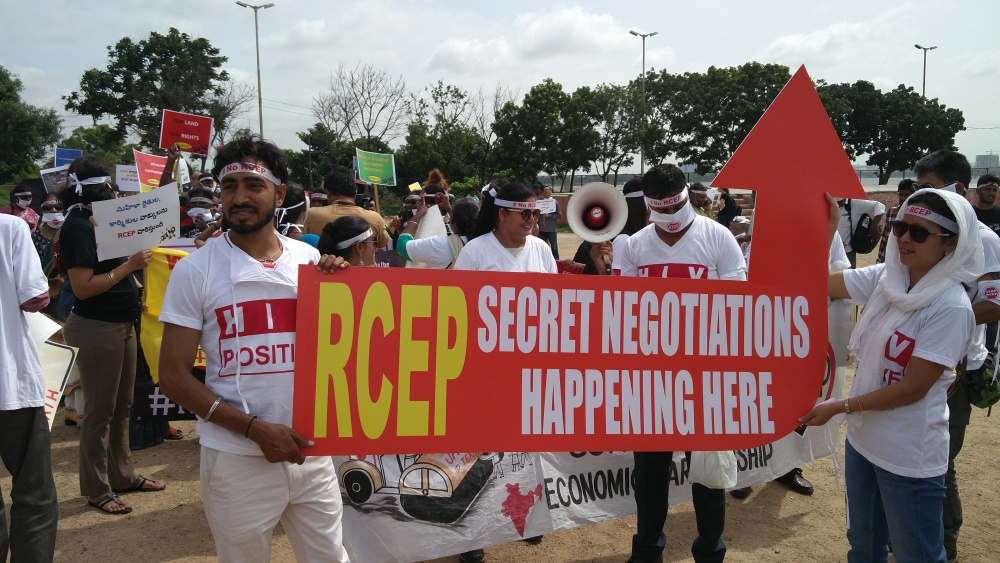Why State Governments Must Engage with RCEP

India played host to the 19th Round of talks for the proposed Regional Comprehensive Economic Partnership (RCEP) from 17-28th July 2017. The talks were held in Hyderabad – the state capital of Telangana, over 1,500 kms from the political capital in New Delhi. But the moot question is – are all the States in the country united in their support of the Centre’s push for new rules of ‘free trade’ in this mega-regional free trade agreement (FTA)?
The Kerala state government was the first to raise its concern about the adverse impact of the RCEP on the agriculture sector. But what about other state governments? How much do they know about the RCEP?
As the proposed RCEP can affect the lives and livelihoods of Indian citizens in numerous ways, there are several important policy matters that state governments should be duly concerned about and should take necessary steps to address them. Apart from the content, the process of negotiations too warrant a deeper engagement of State Governments. Below are a few suggestions on matters to be pursued by the state governments:
- First and foremost, State Governments ought to know about all the subjects falling under the State List of the Constitution of India, which the Government of India (GoI) is currently negotiating in RCEP. In a federal system, there ought to be no decision-making by Ministry of Commerce & Industry (MOCI)/GoI without consultation with the sub-federal units. In its 2014 Election Manifesto, the ruling party (BJP) committed that it would consult states on matters of trade policy. In many countries, consultations are regularly held with state and local authorities on trade agreements. There is a more recent example of this in the FTA between the European Union (EU) and Canada – CETA – which provisionally came into force on 8 July 2017. Canada’s ten provinces (notably Quebec and Ontario), three territories and municipalities knew of CETA.
- To be able to meaningfully engage in the discussions, state capitals ought to be asking the GoI to share all the draft RCEP texts. There are over 23 chapters under consideration, which will constitute the basic set of rules of this FTA.
- India’s negotiating stance on the various chapters/subjects covered in RCEP must be made public.
- Chief Ministers must ask MOCI/GoI for a de-briefing to all the state governments on what decisions were taken at the 19th Round hosted by GoI in Hyderabad.
- There must be a debate on RCEP in the Indian Parliament. The Parliamentary Standing Committee on Commerce must oversee the official deliberations. In other countries, as in EU, parliamentary ratification by each EU member state and some regional legislatures is necessary before EU can ratify an international treaty. In fact, even State Legislative Assemblies need to urgently discuss RCEP and other FTAs, as well as the World Trade Organisation (WTO). Some states have previously had active WTO Cells; these ought to be re-activated with a portfolio to track the ‘WTO-plus’ developments and analyse the implications for people in the State. These cells comprising mostly of government officials were meant for coordination and communication between the Centre and the States on WTO matters.
- Agriculture is one of the most vulnerable sector of India’s economy. Removal of tariffs on agricultural goods from RCEP countries could devastate small producers, including small dairies. Demands by developed countries in RCEP for higher standards of intellectual property could put at risk both seed freedoms of farmers and access to germplasm by researchers in the public sector. States must seek a detailed note from our trade negotiators on how RCEP will potentially impact agriculture and the livelihoods of people dependent on it.
- Next on the RCEP calendar is a Ministerial Conference in the Philippines in September 2017. This is where political decisions on how to proceed ahead with negotiations will be taken. States ought to know who is representing India at the table in Manila next month.
- State Governments, no matter of which political party ought to be in the know of the political position the GoI will be taking on RCEP at the above-mentioned Ministerial Conference.
- The Chief Secretaries in the States must ask for the disclosure of the names of the India’s negotiating team.
- A long pending demand to GoI from people’s groups, mass movements and concerned citizens has been for the institutionalisation of a process by which decentralised decision-making can be made possible on this subject matter. Trade rules and investment policies impact the lives and livelihoods of ordinary citizens in many ways. Therefore, the finalisation of any ‘free trade’ agreements that affect or restrict them, is too serious a matter to be left to a commerce and industry ministry at the Centre.
- It is not good enough to just know what is in the trade and investment rules, but also what is to be done if there is a dispute. After all, it is the states that will have to implement the decisions taken in RCEP. When state governments in their exercise of executive power, choose to rescind a contract with an investor, they might find themselves slapped with investment arbitration suits with claims for damages for millions of dollars. The Government of Andhra Pradesh is currently facing one such investor-state dispute. State Governments must raise a collective voice on the investor-state dispute settlement (ISDS) provisions in the RCEP text.
- Transparency in trade rules must be a non-negotiable point. Yet openness between the Central and State Government is not enough, the process has to be opened up beyond official circles. This is the only way forward for any government, whether at the Centre or the State to facilitate public debate.
Shalini Bhutani is a legal researcher and policy analyst based in Delhi.
Image Courtesy of IndustriALL Global Union
